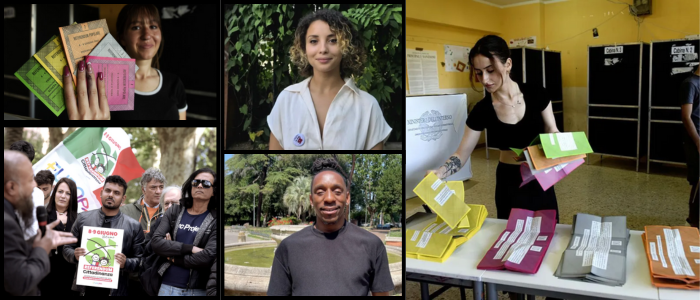For people like 39-year-old Sonny Olumati, a dancer and activist born in Rome to Nigerian parents, the referendum brings the hope of. Though he has lived in Italy for his entire life, Sonny still has a Nigerian passport and a life based on renewing residence permits. "Not having citizenship for the country is like being rejected by your own country," he says.
A Vote That Divided in a Vicious Political Climate
The referendum stands to immediately benefit as many as 1.4 million foreign residents, but Italy's ruling coalition is mostly against it. The prime minister, Giorgia Meloni, has called the current law "perfect," and she has declined to participate in the voting, urging an abstention from her base instead. If fewer than 50% of voters turn out then the referendum will be void.
Its resistance through inaction, critics say — and through scant news media coverage — is strategic. "What they don't want is the referendum to gain visibility," said Roberto D'Alimonte, a professor at Luiss University. Meloni's coalition mate, Roberto Vannacci, has gone even further, charging reformers with "cancelling Italian identity."
As it stands, the law isn't impossible for some to attain citizenship, provided they have the ancestry — 30,000 Argentinians of Italian heritage were naturalized last year, never mind if never set foot in Italy. And people such as Sonny and 28-year-old PhD student Insaf Dimassi are still excluded. Even though she was an infant when she arrived in Italy, and spent her first 18 years in Rome, Insaf remains years away from the possibility of being recognized as a citizen.
A First Shot in the Larger War for Inclusion
While the referendum faces long odds of succeeding, given the anticipated low turnout, its supporters view it as the beginning of a larger battle. Since Sonny can't vote, merely being seen is an accomplishment, as far as he's concerned.
For many residents, this is about more than the law — it is about identity and fitting in. As Insaf says, "Italy raised me and made me who I am, so not being considered a citizen is very painful."
Sonny stays positive, "Even if they vote 'No', we're staying here and well think about what to do next -- we've met too many people, done too many things to let this end. We have got to talk about our community and where it sits in this country."
Politics

Italy's Citizenship Referendum Offers Hope for Long-Term Residents

But thousands of long-term residents with an Italian birth or education are not Italian citizens – a situation at the centre of a national referendum which took place on June 8-9. The vote would propose that children younger than 18 be naturalized along with their parents and that those seeking by naturalized must have lived in the country for five years, as opposed to 10.















